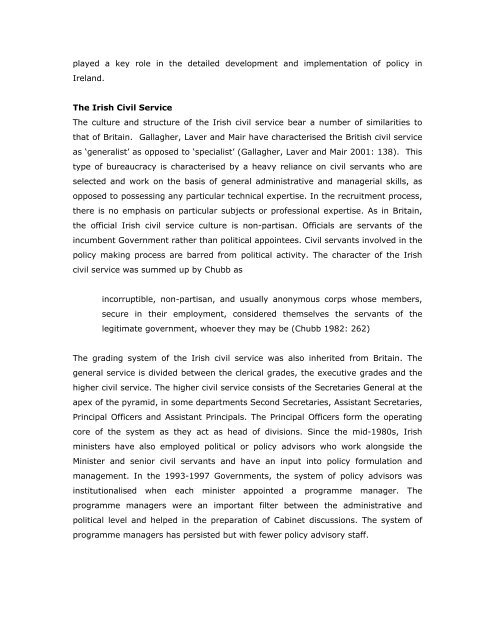Managing Europe From Home: The Europeanisation of the Irish ...
Managing Europe From Home: The Europeanisation of the Irish ...
Managing Europe From Home: The Europeanisation of the Irish ...
You also want an ePaper? Increase the reach of your titles
YUMPU automatically turns print PDFs into web optimized ePapers that Google loves.
played a key role in <strong>the</strong> detailed development and implementation <strong>of</strong> policy in<br />
Ireland.<br />
<strong>The</strong> <strong>Irish</strong> Civil Service<br />
<strong>The</strong> culture and structure <strong>of</strong> <strong>the</strong> <strong>Irish</strong> civil service bear a number <strong>of</strong> similarities to<br />
that <strong>of</strong> Britain. Gallagher, Laver and Mair have characterised <strong>the</strong> British civil service<br />
as ‘generalist’ as opposed to ‘specialist’ (Gallagher, Laver and Mair 2001: 138). This<br />
type <strong>of</strong> bureaucracy is characterised by a heavy reliance on civil servants who are<br />
selected and work on <strong>the</strong> basis <strong>of</strong> general administrative and managerial skills, as<br />
opposed to possessing any particular technical expertise. In <strong>the</strong> recruitment process,<br />
<strong>the</strong>re is no emphasis on particular subjects or pr<strong>of</strong>essional expertise. As in Britain,<br />
<strong>the</strong> <strong>of</strong>ficial <strong>Irish</strong> civil service culture is non-partisan. Officials are servants <strong>of</strong> <strong>the</strong><br />
incumbent Government ra<strong>the</strong>r than political appointees. Civil servants involved in <strong>the</strong><br />
policy making process are barred from political activity. <strong>The</strong> character <strong>of</strong> <strong>the</strong> <strong>Irish</strong><br />
civil service was summed up by Chubb as<br />
incorruptible, non-partisan, and usually anonymous corps whose members,<br />
secure in <strong>the</strong>ir employment, considered <strong>the</strong>mselves <strong>the</strong> servants <strong>of</strong> <strong>the</strong><br />
legitimate government, whoever <strong>the</strong>y may be (Chubb 1982: 262)<br />
<strong>The</strong> grading system <strong>of</strong> <strong>the</strong> <strong>Irish</strong> civil service was also inherited from Britain. <strong>The</strong><br />
general service is divided between <strong>the</strong> clerical grades, <strong>the</strong> executive grades and <strong>the</strong><br />
higher civil service. <strong>The</strong> higher civil service consists <strong>of</strong> <strong>the</strong> Secretaries General at <strong>the</strong><br />
apex <strong>of</strong> <strong>the</strong> pyramid, in some departments Second Secretaries, Assistant Secretaries,<br />
Principal Officers and Assistant Principals. <strong>The</strong> Principal Officers form <strong>the</strong> operating<br />
core <strong>of</strong> <strong>the</strong> system as <strong>the</strong>y act as head <strong>of</strong> divisions. Since <strong>the</strong> mid-1980s, <strong>Irish</strong><br />
ministers have also employed political or policy advisors who work alongside <strong>the</strong><br />
Minister and senior civil servants and have an input into policy formulation and<br />
management. In <strong>the</strong> 1993-1997 Governments, <strong>the</strong> system <strong>of</strong> policy advisors was<br />
institutionalised when each minister appointed a programme manager. <strong>The</strong><br />
programme managers were an important filter between <strong>the</strong> administrative and<br />
political level and helped in <strong>the</strong> preparation <strong>of</strong> Cabinet discussions. <strong>The</strong> system <strong>of</strong><br />
programme managers has persisted but with fewer policy advisory staff.



